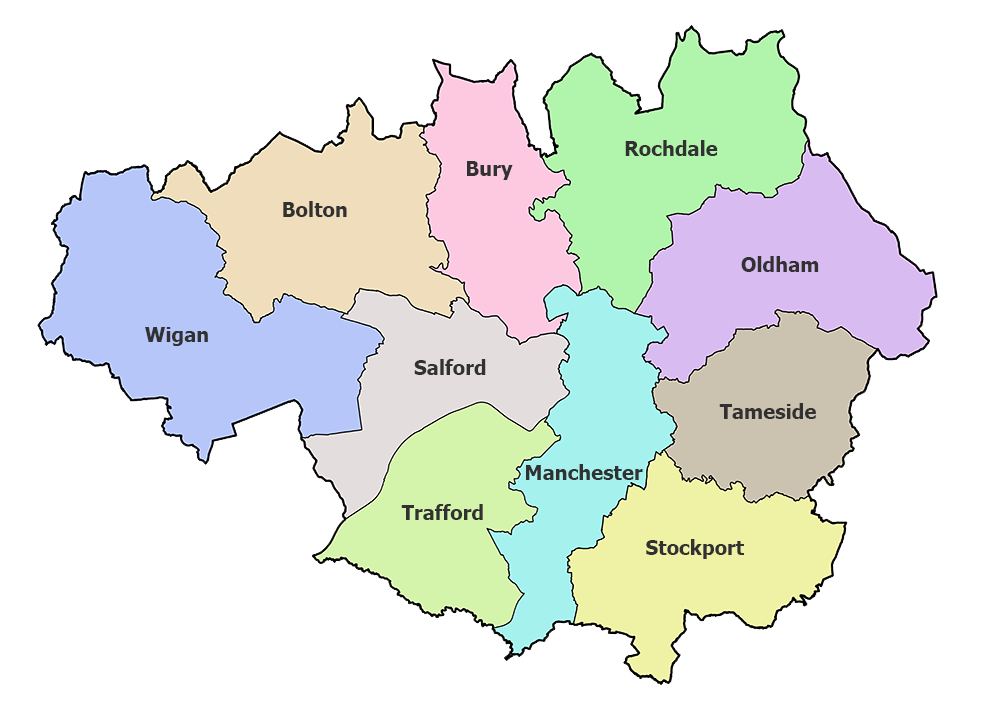Manchester Voices is a research project which explores the rich tapestry of accents, dialects, and identities that make up Greater Manchester. The project is based at Manchester Metropolitan University, and is funded by the Arts and Humanities Research Council. Data collection for the project is now complete, and we have launched our interactive installation at Manchester Central Library. Here, you can explore hundreds of videos, recordings and maps, along with some of our analysis. The installation can be found in the Archives+ area of the library on the ground floor.
There is now an online version of the installation which is available to everyone. You can find it at explore.manchestervoices.org.
There are seven main strands to the project:
1. The Accent Van

The summer of 2021 saw us out and about in our Accent Van – a specially kitted-out vehicle which served as a mobile interview booth and recording studio. We travelled to various places across the 10 boroughs of Greater Manchester, inviting people to take part. Participants were asked to share their thoughts on how they speak, reflecting on deeply embedded beliefs regarding the status and value of their own, and other people’s, accents and dialects and how they relate spoken language to a sense of local identity. This provided us with both linguistic data in terms of language variation, and social data in terms of feelings towards that variation.
2. Virtual Accent van
For people who weren’t able to be out and about to visit The Accent Van, we provided the same experience online throigh our Virtual Accent Van. Participants were interviewed by our Accent Van virtual assistant, and their recordings were automatically submitted to us when they finished.
3. Online mapping of people’s perceptions
Regional accents and dialects are heavily bound to notions of place and belonging; as such, this aspect of the project seeks to explore the geographical landscape of Greater Manchester from a sociolinguistic perspective and to advance our understanding of the various accents, dialects and identities of the region. Using a specially-designed online tool, people were invited to draw a digital map of where they feel people speak differently from one another within Greater Manchester, before naming and describing the dialects, and giving any examples of sounds, words and grammar that they perceive to characterise each area. The digital map data was analysed using GIS (Geographic Information Systems) techniques, enabling us to create heat maps showing areas where certain dialects are thought to be spoken and where perceptions of dialects are shared.
4. Directions task and pronunciation maps
We asked people to take part in a task where they described the route along a map, navigating their way past landmarks which were designed to elicit particular words and sounds. We used these recordings to investigate small differences in pronunciation across the ten boroughs of Greater Manchester.
5. Language attitude surveys
Early in 2021 we ran our Accent Attitudes Quiz, where people listened to voices of people from Greater Manchester, described them on three different scales, and tried to guess guess where they’re from. This survey helped us to track people’s thoughts and feelings about the speech of the region. Investigating people’s attitudes towards accents and dialects is crucial to explaining their use, loss, and maintenance at a community level, since they help us to understand the social meanings attached to linguistic features (e.g., sounds, words and grammatical forms). Attitudes also enable us to explore the ways in which individuals and groups identify and associate with one another within our local communities – for example, the feelings people from different boroughs, from different linguistic and cultural backgrounds, and of different age groups may have about their own and others’ speech (and about the speakers themselves). This aspect of the project seeks to uncover deeply embedded and widely held beliefs about regional accents and dialects, and to use this data to challenge any negative perceptions, to promote linguistic equality and diversity, and to nurture a sense of social and regional pride.
6. ‘Talking About Voices’ podcast resource and competition for schools
Talking About Voices is an opportunity for secondary school pupils in Greater Manchester to learn about audio production while also reflecting on issues around language and identity. The objective is for pupils to make a short podcast episode about language and identity, with plenty of ideas, training and support provided along the way. The materials can be used remotely, as well an in class. You can listen to the winning episodes from Round 1 here. You can find out a bit more about this part of the project on the Talking About Voices website (talkingaboutvoices.org).
7. Analysing historical recordings from the region
Unlocking Our Sound Heritage is a fantastic project being carried out by the British Library and its partners across the UK, including Archives+ at Manchester Central Library. Funded by the National Lottery Heritage Fund as part of the wider Save Our Sounds programme, the project aims to preserve and provide access to half a million of the nation’s rare and unique sound recordings. We are working with Archives+ to transcribe and analyse recordings from across Greater Manchester. This provides us with the perfect opportunity to compare speech from people born at the turn of the 20th Century with their counterparts in the present day.
Manchester Voices is an AHRC-funded project that is truly about, with, and for the people of Greater Manchester. By bringing regional accents and dialects to the fore of public consciousness, we hope that they will come to be understood and appreciated in new ways.
